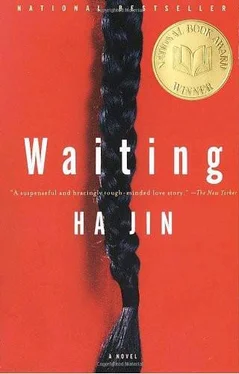"What are you doing?" she cried, leaping to her feet. Her abrupt movement scared away the mallards and geese in the water. She didn't understand his intention and thought he had attempted something indecent, like a hoodlum. She didn't remember ever being kissed by anyone.
He looked puzzled, then muttered, "I didn't mean to make you angry like this."
"Don't ever do that again."
"All right, I won't. " He turned away from her and looked piqued, spitting on the grass.
From then on, though she didn't reproach him again, she resisted his advances resolutely, her sense of virtue and honor preventing her from succumbing to his desire. Her resistance kindled his passion. Soon he told her that he couldn't help thinking of her all the time, as though she had become his shadow. Sometimes at night, he would walk alone in the compound of the Sub-Command headquarters for hours, with his 1951 pistol stuck in his belt. Heaven knew how he missed her and how many nights he remained awake tossing and turning while thinking about her. Out of desperation, he proposed to her two months before her graduation. He wanted to marry her without delay.
She thought he must have lost his mind, though by now she also couldn't help thinking of him for an hour or two every night. Her head ached in the morning, her grades were suffering, and she was often angry with herself. She would lose her temper with others for no apparent reason. When nobody was around, tears often came to her eyes. For all their love, an immediate marriage would be impracticable, out of the question. She was uncertain where she would be sent when she graduated, probably to a remote army unit, which could be anywhere in Manchuria or Inner Mongolia. Besides, a marriage at this moment would suggest that she was having a love affair; this would invite punishment, the lightest of which the school would administer was to keep the couple as separate as possible. In recent years the leaders had assigned some lovers to different places deliberately.
She revealed Mai Dong's proposal to nobody except her teacher Lin Kong, who was known as a good-hearted married man and was regarded by many students as a kind of elder brother. In such a situation she needed an objective opinion. Lin agreed that a marriage at this moment was unwise, and that they had better wait a while until her graduation and then decide what to do. He promised he would let nobody know of the relationship. In addition, he said he would try to help her in the job assignment if he was involved in making the decision.
She reasoned Mai Dong out of the idea of an immediate marriage and assured him that she would become his wife sooner or later. As graduation approached, they both grew restless, hoping she would remain in Muji City. He was depressed, and his despondency made her love him more.
At the graduation she was assigned to stay in the hospital and work in its Medical Department as a nurse — a junior officer of the twenty-fourth rank. The good news, however, didn't please Mai Dong and Manna for long, because a week later he was informed that his radio station was going to be transferred to a newly formed regiment in Fuyuan County, almost eighty miles northeast of Muji and very close to the Russian border.
"Don't panic," she told him. "Work and study hard on the front. I'll wait for you." Though also heartbroken, she felt he was a rather pathetic man. She wished he were stronger, a man she could rely on in times of adversity, because life always had unexpected misfortunes.
"When will we get married?" he asked.
"Soon, I promise."
Despite saying that, she was unsure whether he would be able to come back to Muji. She preferred to wait a while.
The nearer the time for departure drew, the more embittered Mai Dong became. A few times he mentioned he would rather be demobilized and return to Shanghai, but she dissuaded him from considering that. A discharge might send him to a place far away, such as an oil field or a construction corps building railroads in the interior of China. It was better for them to stay as close as possible.
When she saw him off at the front entrance of the Sub-Command headquarters, she had to keep blowing on her fingers, having forgotten to bring along her mittens. She wouldn't take the fur gloves he offered her; she said he would need them more. He stood at the back door of the radio van, whose green body had turned gray with encrusted ice and snow. The radio antenna atop the van was tilting in the wind, which, with a shrill whistle, again and again tried to snatch it up and bear it off. More snow was falling, and the air was piercingly cold. Mai Dong's breath hung around his face as he shouted orders to his soldiers in the van, who gathered at the window, eager to see what Manna looked like. Outside the van, a man loaded into a side trunk some large wooden blocks needed for climbing the slippery mountain roads. The driver kicked the rear wheels to see whether the tire chains were securely fastened. His fur hat was completely white, a nest of snowflakes.
As the van drew away, Mai Dong waved good-bye to Manna, his hand stretching through the back window, as though struggling to pull her along. He wanted to cry, "Wait for me, Manna!" but he dared not get that out in the presence of his men. Seeing his face contort with pain, Manna's eyes blurred with tears. She bit her lips so as not to cry.
Winter in Muji was long. Snow wouldn't disappear until early May. In mid-April when the Songhua River began to break up, people would gather at the bank watching the large blocks of ice cracking and drifting in the blackish-green water. Teenage boys, baskets in hand, would tread and hop on the floating ice, picking up pike, whitefish, carp, baby sturgeon, and catfish killed by the ice blocks that had been washed down by spring torrents. Steamboats, still in the docks, blew their horns time and again. When the main channel was finally clear of ice, they crept out, sailing slowly up and down the river and saluting the spectators with long blasts. Children would hail and wave at them.
Then spring descended all of a sudden. Aspen catkins flew in the air, so thick that when walking on the streets you could breathe them in and you would flick your hand to keep them away from your face. The scent of lilac blooms was pungent and intoxicating. Yet old people still wrapped themselves in fur or cotton-padded clothes. The dark earth, vast and loamy, marked by tufts of yellow grass here and there, began emitting a warm vapor that flickered like purple smoke in the sunshine. All at once apricot and peach trees broke into blossoms, which grew puffy as bees kept touching them. Within two weeks the summer started. Spring was so short here that people would say Muji had only three seasons.
In her letters to Mai Dong, Manna described these seasonal changes as though he had never lived in the city. As always, he complained in his letters about life at the front. Many soldiers there suffered from night blindness because they hadn't eaten enough vegetables. They all had lice in their underclothes since they couldn't take baths in their barracks. For the whole winter and spring he had seen only two movies. He had lost fourteen pounds, he was like a skeleton now. To comfort him, each month Manna mailed him a small bag of peanut brittle.
One evening in June, Manna and two other nurses were about to set out for the volleyball court behind the medical building. Ben-ping, the soldier in charge of mail and newspapers, came and handed her a letter. Seeing it was from Mai Dong, her teammates teased her, saying, "Aha, a love letter."
She opened the envelope and was shocked while reading through the two pages. Mai Dong told her that he couldn't stand the life on the border any longer and had applied for a discharge, which had been granted. He was going back to Shanghai, where the weather was milder and the food better. More heartrending, he had decided to marry his cousin, who was a salesgirl at a department store in Shanghai. Without such a marriage, he wouldn't be able to obtain a residence card, which was absolutely necessary for him to live and find employment in the metropolis. In reality he and the girl had been engaged even before he had applied for his discharge; otherwise he wouldn't have been allowed to go to Shanghai, since he was not from the city proper but from one of its suburban counties. He was sorry for Manna and asked her to hate and forget him.
Читать дальше











